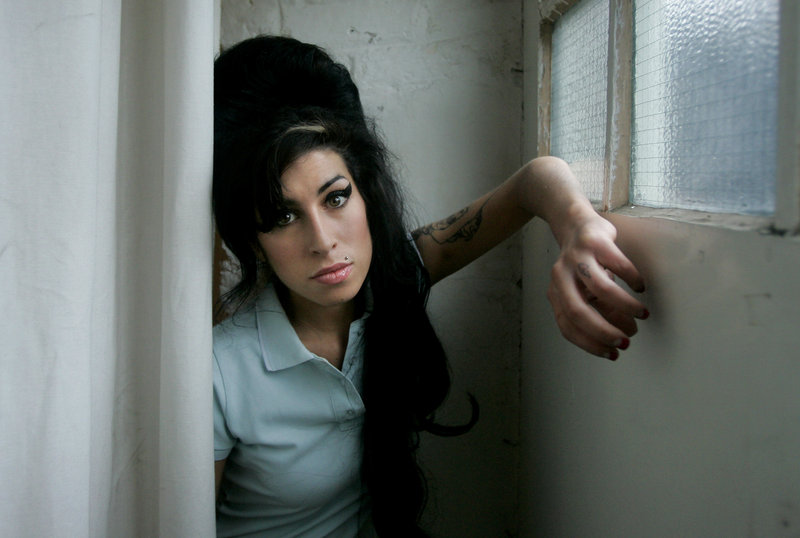LONDON – Few artists summed up their own career in a single song — a single line — as well as Amy Winehouse.
“They tried to make me go to rehab,” she sang on her world-conquering 2006 single, “Rehab.” ” I said ‘No, no no.’ “
Occasionally, she said yes, but to no avail: repeated stints in hospitals and clinics couldn’t stop alcohol and drugs scuttling the career of a singer whose distinctive voice, rich mix of influences and heart-on-her sleeve sensibility seemed to promise great things.
In her short lifetime, Winehouse too often made headlines because of drug and alcohol abuse, eating disorders, destructive relationships and abortive performances. But it’s her small but powerful body of recorded music that will be her legacy.
The singer was found dead Saturday by ambulance crews called to her home in north London’s Camden area, a youth-culture mecca known for its music scene, its pubs — and the availability of illegal drugs.
The London Ambulance Service said Winehouse had died before ambulance crews arrived at the house. The cause of death was not immediately known.
It was not a complete surprise, but the news was still a huge shock for millions around the world. The size of Winehouse’s appeal was reflected in the extraordinary range of people paying tribute as they heard the news, from Demi Moore — who tweeted “Truly sad news … May her troubled soul find peace” — to chef Jamie Oliver, who wrote “such a waste, raw talent” on the social networking site.
Tony Bennett, who recorded the pop standard “Body And Soul” with Winehouse at Abbey Road Studios in London in March for an upcoming duets album, called her “an artist of immense proportions.”
“She was an extraordinary musician with a rare intuition as a vocalist and I am truly devastated that her exceptional talent has come to such an early end,” he said.
Rolling Stone Ronnie Wood said he was dedicating Saturday’s reunion performance of his band The Faces to Winehouse. “It’s a very sad loss of a very good friend I spent many great times with,” he said.
Winehouse was something rare in an increasingly homogenized music business — an outsized personality and an unclassifiable talent.
She shot to fame with the album “Back to Black,” whose blend of jazz, soul, rock and classic pop was a global hit. It won five Grammys and made Winehouse — with her black beehive hairdo and old-fashioned sailor tattoos — one of music’s most recognizable stars.
“I didn’t go out looking to be famous,” Winehouse told the Associated Press when the album was released. “I’m just a musician.”
But in the end, the music was overshadowed by fame, and by Winehouse’s demons. Tabloids lapped up the erratic stage appearances, drunken fights, stints in hospital and rehab clinics. Performances became shambling, stumbling train wrecks, watched around the world on the Internet.
Last month, Winehouse canceled her European comeback tour after she swayed and slurred her way through barely recognizable songs in her first show in the Serbian capital of Belgrade. Booed and jeered off stage, she flew home and her management said she would take time off to recover.
Fans who had kept the faith waited in vain for a followup to “Back to Black.”
Born in 1983 to taxi driver Mitch Winehouse and his pharmacist wife Janis, Winehouse grew up in the north London suburbs, and was set on a showbiz career from an early age.
She attended the Sylvia Young Theatre School, a factory for British music and acting moppets, later went to the Brit School, a performing arts academy in the “Fame” mold.
But Winehouse was never a packaged teen star, and always resisted being pigeonholed.
Her jazz-influenced 2003 debut album, “Frank,” was critically praised and sold well in Britain. It earned Winehouse an Ivor Novello songwriting award, two Brit nominations and a spot on the shortlist for the Mercury Music Prize.
“Frank” was followed by a slump during which Winehouse broke up with her boyfriend, suffered a long period of writer’s block and, she later said, smoked a lot of marijuana.
The next album she eventually produced was a sensation.
Released in Britain in the fall of 2006, “Back to Black” brought Winehouse global fame. Working with producers Mark Ronson and Salaam Remi and soul-funk group the Dap-Kings, Winehouse fused soul, jazz, doo-wop and, above all, a love of the girl-groups of the early 1960s with lyrical tales of romantic obsession and emotional excess.
“Back to Black” was released in the United States in March 2007 and went on to win five Grammy awards, including song and record of the year for “Rehab.”
Copy the Story Link
Send questions/comments to the editors.



Success. Please wait for the page to reload. If the page does not reload within 5 seconds, please refresh the page.
Enter your email and password to access comments.
Hi, to comment on stories you must . This profile is in addition to your subscription and website login.
Already have a commenting profile? .
Invalid username/password.
Please check your email to confirm and complete your registration.
Only subscribers are eligible to post comments. Please subscribe or login first for digital access. Here’s why.
Use the form below to reset your password. When you've submitted your account email, we will send an email with a reset code.